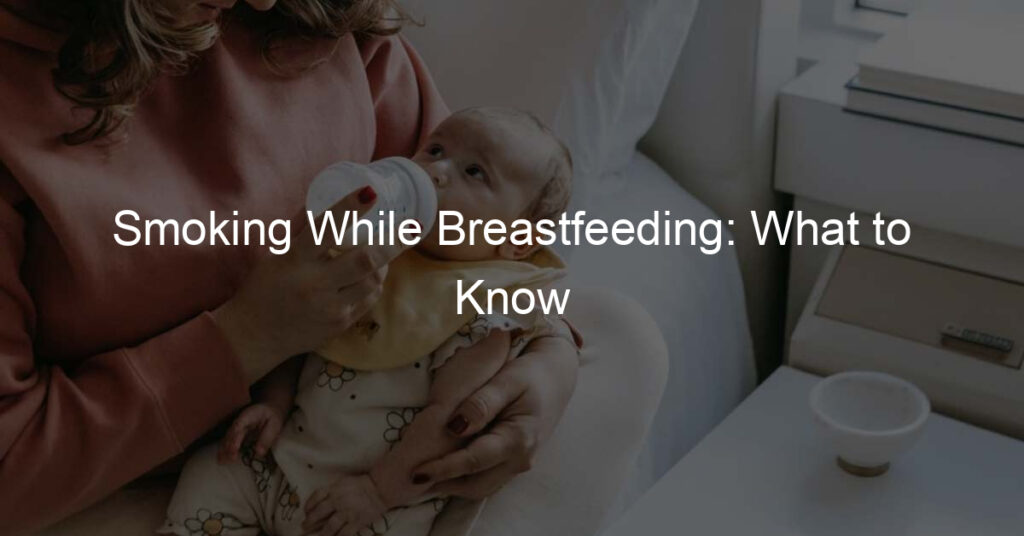There is a lot of debate surrounding smoking while breastfeeding. Some people believe that it is perfectly safe, while others think it can be harmful to both the mother and child. So what is the truth? Let’s take a look at what some experts have to say about smoking while breastfeeding.
What can happen if I smoke while breastfeeding?
It is not advisable to smoke while breastfeeding as the substances found in cigarette smoke, such as carbon monoxide and nicotine, can easily pass into the breast milk and adversely affect your baby’s health.
Smoking while breastfeeding increases the risk of your baby developing asthma, colic or respiratory illness, and being overweight due to poor diet. Consuming tobacco can also reduce concentrations of certain drugs and vitamins in your milk which can lead to deficiencies for your baby. There is also a heightened risk of sudden infant death syndrome (SIDS) when babies are around secondhand smoke.
To best protect your baby from the dangers of smoking while breastfeeding, it is wise to avoid every kind of smoking during feeding times.
How long does it take for cigarette smoke to leave breast milk?
Mothers need to understand how long it takes for cigarette smoke to leave breast milk.
Exposure to cigarette smoke, even secondhand smoke, can be dangerous for infants. If a mother smokes regularly, or if she and the infant are in a tobacco-filled environment, the toxins from the cigarette smoke can pass into their milk supply. On average, it takes between 1-3 days for these toxins to completely leave her breast milk. To best protect an infant, women should limit their exposure to cigarettes and other forms of tobacco as much as possible during breastfeeding periods.
By following this recommended timeline, mothers can ensure that their children will not be exposed to dangerous compounds in breast milk and can enjoy a healthy start in life.
How many cigarettes a day can I smoke while breastfeeding?
Smoking cigarettes while breastfeeding is never recommended by most health professionals, but if the choice is made to smoke, it’s important to understand how this might affect your baby and the best way to minimize potential risks.
Doctors generally suggest that nursing moms try not to smoke more than five cigarettes a day. When possible, it’s better to limit smoking even further by avoiding smoking directly before or after breastfeeding as much of the nicotine will pass through breast milk and affect the infant. Additionally, some studies have shown that chemicals from cigarettes can linger on clothes or skin and enter your baby through non-oral contact.
For these reasons, it’s important for moms who choose to smoke while breastfeeding to be mindful and take the necessary steps to protect their babies as much as possible.
How many cigarettes will affect breast milk?
Smoking cigarettes is one of the most dangerous activities that a mother can engage in, as it not only detrimentally affects her health but also can pass chemicals and toxins through her breast milk.
Numerous studies have shown that breastfeeding mothers who smoke cigarette put their babies at risk for physical deformities, illnesses, and even Sudden Infant Death Syndrome. Beyond the physical issues cigarettes can cause babies, smoking also reduces vital nutrients available in breast milk such as vitamins A and E as well as calcium and zinc. What’s worse is that the effects of cigarettes are cumulative: if she smokes throughout breastfeeding, she could seriously affect her child’s future health and development.
Given how many negatives smoking cigarettes has on breastfeeding mothers and their children, it isn’t worth the risk – so it is highly advised that mothers abstain from smoking while nursing their infant.
How do you get nicotine out of breast milk?
Smoking tobacco can be extremely harmful, not just for your health, but for the health of those around you as well. Unfortunately, this includes your child since nicotine from cigarettes can enter breast milk. Despite the potential dangers, many mothers still choose to breastfeed their babies and it is important to learn how to properly clean nicotine out of their milk.
There are a few methods that could help reduce the levels of nicotine in breast milk such as abstaining from smoking for at least 2 hours before breastfeeding or even hand expression instead of using a pump. Drinking plenty of fluids can also help clear toxins quicker and making sure fully express the breasts before feeding helps remove any excess buildup.
Newborns should always receive the best nutrition they can get and ensuring that their breast milk is as pure as possible is key!
Final Thoughts: Smoking While Breastfeeding: What to Know?
It is important to take into account the risks that smoking has on both mother and baby when deciding whether to smoke while breastfeeding. Although theoretically feasible, smoking while breastfeeding can lead to exposing your infant to hazardous chemicals and environmental pollutants, as well as decrease breast milk production and supply.
Every mother should recognize the potential long-term health outcomes for both herself and her baby, develop a plan for quitting smoking with the help of a healthcare provider or support group if needed, and strive for creating the most positive environment for their child’s life. Ultimately, making healthier lifestyle choices during breastfeeding provides a greater chance of leaving your child with an improved quality of life in the long run.














